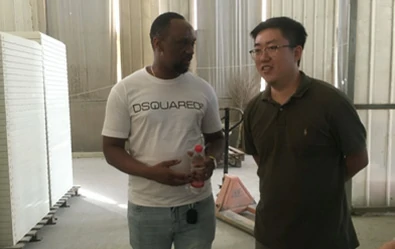loading...
- No. 9, Xingyuan South Street, Dongwaihuan Road, Zaoqiang County, Hengshui, Hebei, China
- admin@zjcomposites.com
- +86 15097380338
- Welcome to visit our website!
frp pressure vessel manufacturers
FRP Pressure Vessel Manufacturers A Comprehensive Overview
Fiberglass Reinforced Plastic (FRP) pressure vessels have gained prominence in various industries due to their unique combination of strength, light weight, and corrosion resistance. As industries across the globe strive for more efficient, durable, and cost-effective solutions, the demand for FRP pressure vessels is on the rise. This article delves into the world of FRP pressure vessel manufacturers, the benefits of using FRP technology, and the future outlook of this critical sector.
What Are FRP Pressure Vessels?
FRP pressure vessels are containers designed to hold gases or liquids at a pressure substantially different from the ambient pressure. They are constructed using a composite material consisting of a polymer matrix reinforced with fiberglass. This technology imparts significant strength and durability while minimizing weight. FRP pressure vessels are widely used in various applications, including water treatment, chemical storage, and oil and gas exploration.
Advantages of FRP Pressure Vessels
1. Corrosion Resistance One of the most compelling reasons to use FRP pressure vessels is their exceptional resistance to corrosion. Unlike traditional materials, such as steel, fiberglass does not rust or corrode when exposed to harsh chemicals and environmental conditions. This makes FRP an ideal choice for industries dealing with corrosive fluids.
2. Weight Savings FRP vessels are significantly lighter than their metal counterparts. This not only reduces transportation costs but also allows for easier installation and maintenance. The lightweight nature of these vessels makes them suitable for applications where weight is a critical factor.
3. Cost-Effectiveness While the initial investment for FRP pressure vessels may be higher than traditional materials, the long-term savings can be significant. Their durability leads to lower maintenance costs and reduced downtime, which translates to enhanced operational efficiency and improved bottom lines for businesses.
4. Temperature Resistance FRP materials can be engineered to withstand a wide range of temperatures, making them suitable for various applications, including those involving high temperatures or extreme cold.
5. Design Flexibility The manufacturing process of FRP allows for a wide range of designs and customizations. Manufacturers can create vessels that meet specific requirements, including size, shape, and pressure ratings.
The Role of FRP Pressure Vessel Manufacturers
frp pressure vessel manufacturers

FRP pressure vessel manufacturers play a critical role in the supply chain of industries that rely on these advanced materials. They are responsible for the design, manufacturing, and quality control of pressure vessels. Leading manufacturers employ advanced engineering techniques and state-of-the-art technologies to produce high-quality vessels that meet stringent safety and performance standards.
Manufacturers often collaborate with customers to develop tailored solutions that meet specific industry needs. This collaborative approach ensures that the final product meets not only the technical requirements but also aligns with industry regulations and safety standards.
Top FRP Pressure Vessel Manufacturers
Several companies stand out in the realm of FRP pressure vessel manufacturing. Noteworthy names typically include
- Raven Industries Known for their commitment to quality and innovation, Raven Industries has a robust portfolio of FRP products, including pressure vessels used in environmental and industrial applications.
- Bristol Corporation Specializing in custom FRP solutions, Bristol Corporation emphasizes durability and performance, catering to various sectors, including chemical processing and water treatment.
- Horizon Fiberglass With a focus on sustainability, Horizon Fiberglass manufactures a range of FRP vessels renowned for their reliability and efficiency, making them a favorite among environmentally conscious industries.
Future Outlook
The future of FRP pressure vessel manufacturing appears bright as awareness of the advantages they offer continues to spread. Innovations in materials science and manufacturing processes are likely to enhance the performance and applicability of FRP technology even further. As industries grow increasingly focused on sustainability and efficiency, manufacturers that adapt to these changing demands will be positioned for success.
In conclusion, the landscape of FRP pressure vessel manufacturers is characterized by innovation, collaboration, and an unwavering commitment to quality. By harnessing the unique benefits of FRP technology, these manufacturers are not only meeting current market needs but are also paving the way for future advancements in pressure vessel design and application.
-
The Rise of FRP Profiles: Strong, Lightweight, and Built to LastNewsJul.14,2025
-
SMC Panel Tanks: A Modern Water Storage Solution for All EnvironmentsNewsJul.14,2025
-
GRP Grating: A Modern Solution for Safe and Durable Access SystemsNewsJul.14,2025
-
Galvanized Steel Water Tanks: Durable, Reliable, and Ready for UseNewsJul.14,2025
-
FRP Mini Mesh Grating: The Safer, Smarter Flooring SolutionNewsJul.14,2025
-
Exploring FRP Vessels: Durable Solutions for Modern Fluid HandlingNewsJul.14,2025
-
GRP Structures: The Future of Lightweight, High-Performance EngineeringNewsJun.20,2025
